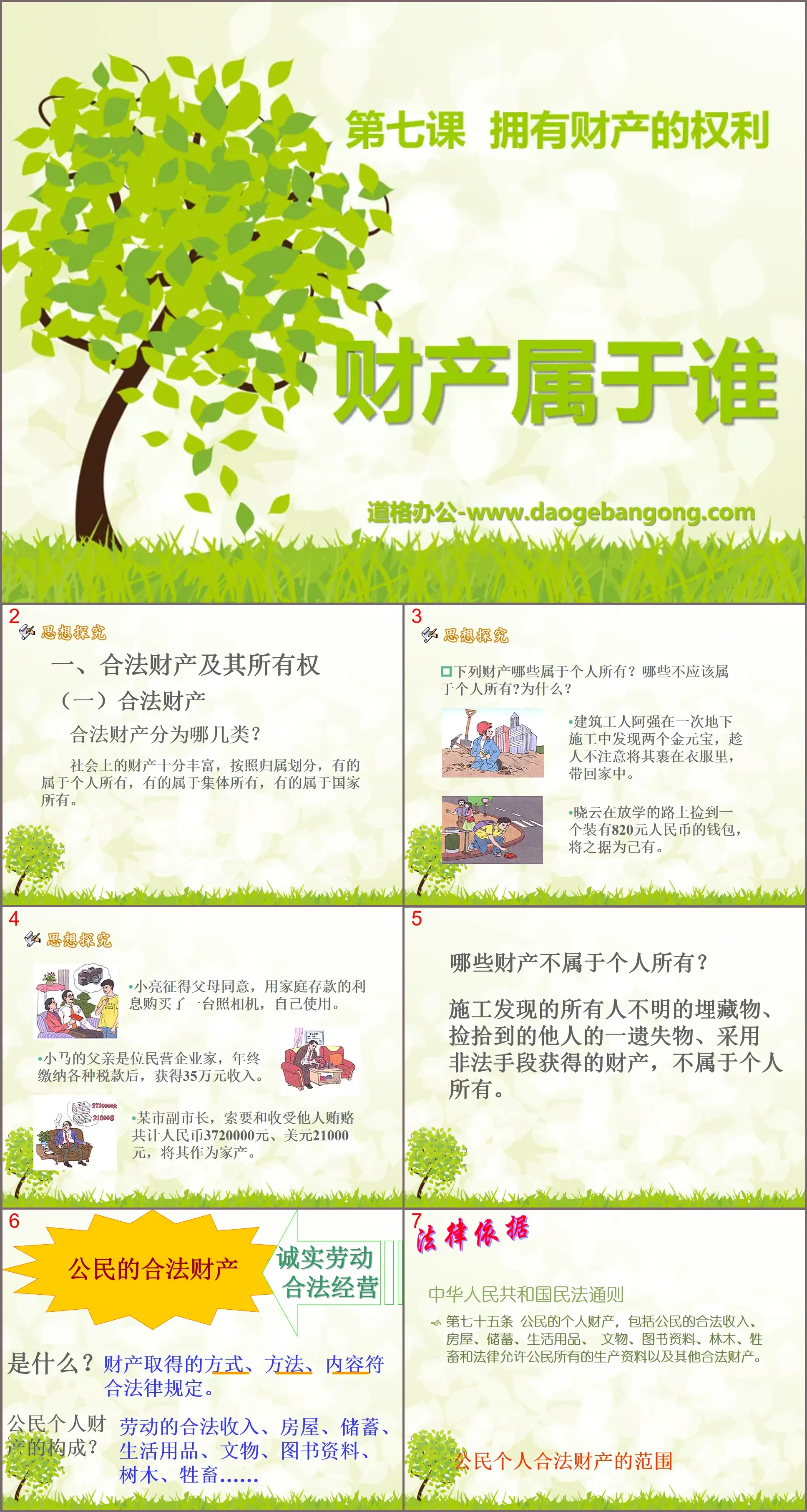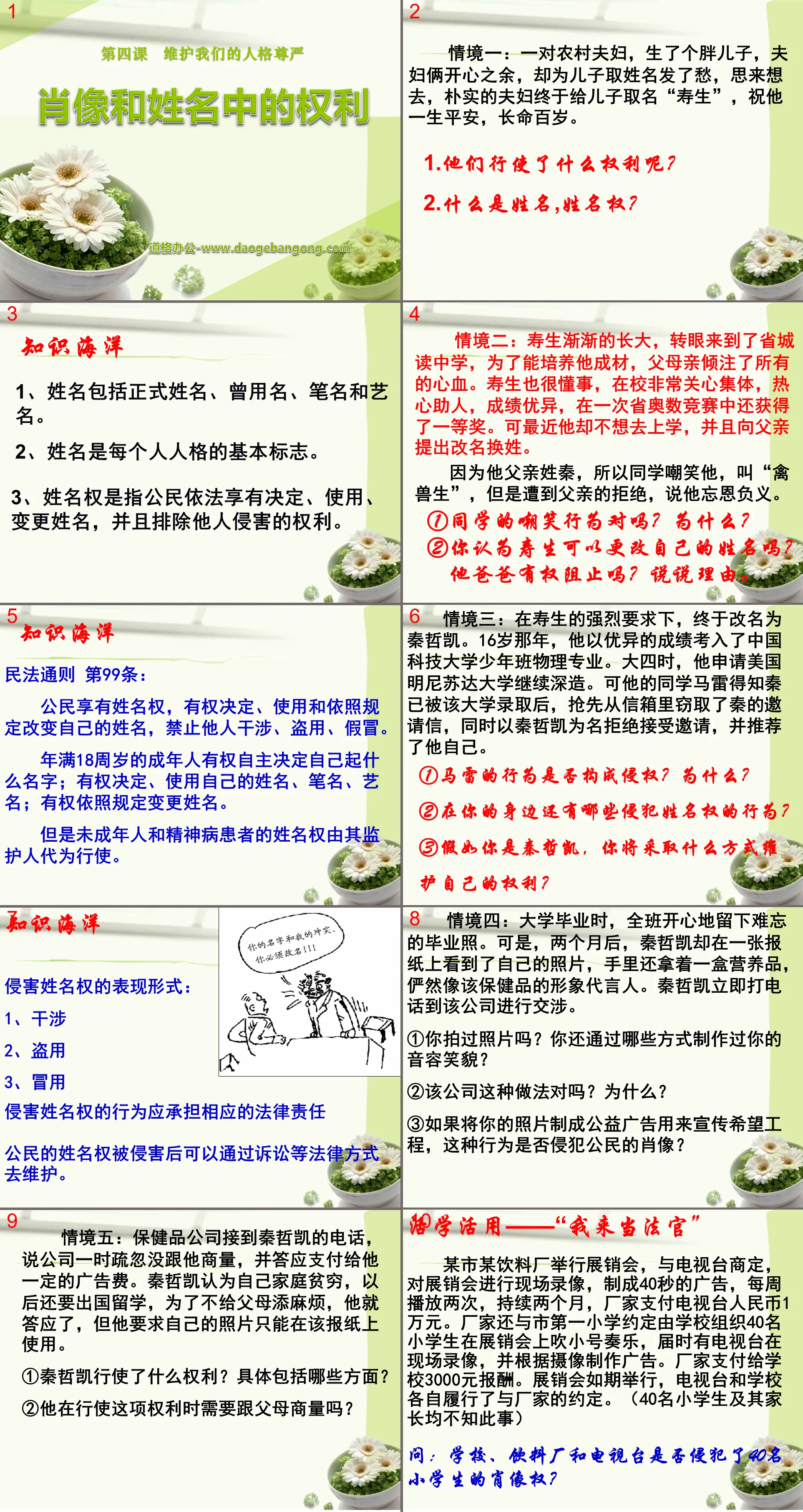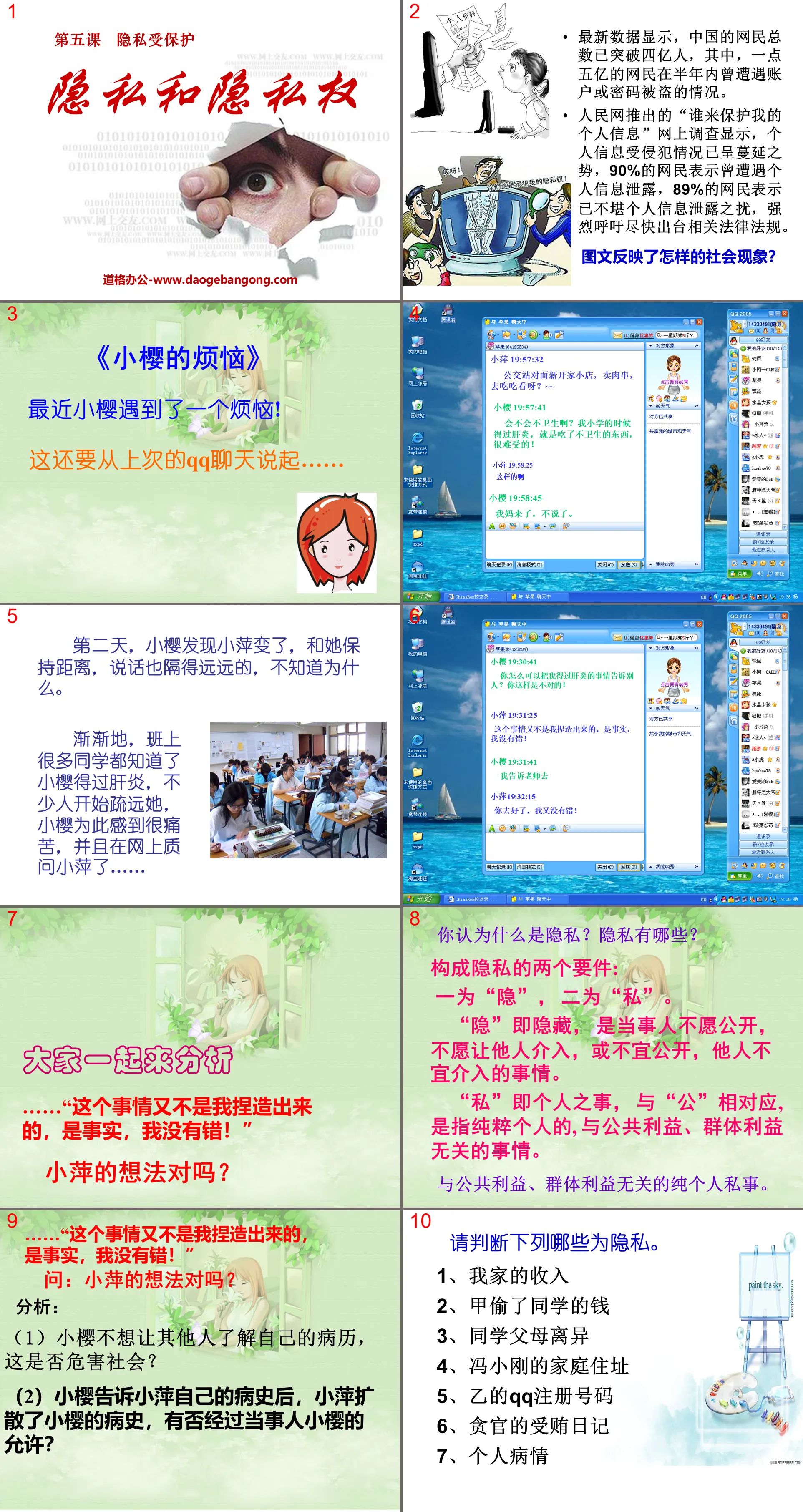"Who does the property belong to?" The right to own property PPT courseware 2 Simple campus recruitment activity planning plan summary enterprise and institution recruitment publicity lecture PPT template is a general PPT template for business post competition provided by the manuscript PPT, simple campus recruitment activity planning plan summary enterprise and institution recruitment promotion Lecture PPT template, you can edit and modify the text and pictures in the source file by downloading the source file. If you want more exquisite business PPT templates, you can come to grid resource. Doug resource PPT, massive PPT template slide material download, we only make high-quality PPT templates!
| 文件名 如何下载使用 | 下载次数 | Download Points | 下载地址 |
|---|---|---|---|
| "Who does the property b... | 24050次 | 0.00 | Free Download |
Tips: If you open the template and feel that it is not suitable for all your needs, you can search for related content "Who does the property belong to?" The right to own property PPT courseware 2 is enough.
How to use the Windows system template
Directly decompress the file and use it with office or wps
How to use the Mac system template
Directly decompress the file and use it Office or wps can be used
Related reading
For more detailed PPT-related tutorials and font tutorials, you can view: Click to see
How to create a high-quality technological sense PPT? 4 ways to share the bottom of the box
Notice
Do not download in WeChat, Zhihu, QQ, built-in browsers, please use mobile browsers to download! If you are a mobile phone user, please download it on your computer!
1. The manuscript PPT is only for study and reference, please delete it 24 hours after downloading.
2. If the resource involves your legitimate rights and interests, delete it immediately.
3. Contact information: service@daogebangong.com
"Who does the property belong to?" The right to own property PPT courseware 2, due to usage restrictions, it is only for personal study and reference use. For commercial use, please go to the relevant official website for authorization.
(Personal non-commercial use refers to the use of this font to complete the display of personal works, including but not limited to the design of personal papers, resumes, etc.)

Related reading
For more detailed PPT-related tutorials and font tutorials, you can view:Please click to see










Authoritative PPT Summary
"Who does the property belong to?" The right to own property PPT courseware 2
1. Legal property and its ownership
(1) Legal property
What are the categories of legal property?
Property in society is very abundant. According to the classification of ownership, some are owned by individuals, some are collectively owned, and some are owned by the state.
Which of the following properties are owned by an individual? What should not be personal property? Why?
A construction worker, A Qiang, discovered two gold ingots during an underground construction project. He wrapped them in his clothes and took them home without anyone noticing.
Xiaoyun picked up a wallet containing 820 yuan on the way home from school and took it for herself.
What property is not personally owned?
Buried objects with unknown owners discovered during construction, lost objects picked up by others, and property obtained through illegal means do not belong to individuals.
citizens' legal property
What is it?
The manner, method and content of property acquisition comply with legal provisions.
What constitutes a citizen’s personal property?
Legal income from labor, houses, savings, daily necessities, cultural relics, books and materials, trees, livestock...
1. Citizens’ property ownership
1. What does a citizen’s private property include?
Supplies:
Production: enterprises, factories, farms, equipment······
Life: (houses, cars, daily necessities...)
Other legal property: income, savings, stocks, interest
Works, patents, invention rights, etc. (intellectual achievements)
2. What is property ownership?
Article 71 of the General Principles of Civil Law Property ownership refers to the owner’s right to possess, use, benefit from and dispose of his own property in accordance with the law.
Property ownership has four rights: right of possession, right of use, right of income and right of disposal
(2) Property ownership
Possession - The physical right of a property owner to control his or her property.
The right of possession is generally exercised by the property owner himself. In real life, it is also common for ownership to be transferred to others according to legal provisions or according to the wishes of the property owner.
Usufruct - The right of a property owner to utilize the property to satisfy his or her own needs according to its properties and uses.
The purpose of possession is to use. However, some use it themselves, and some transfer the use rights to others to obtain benefits. For example, rental housing, etc.
Usufruct - The right of a property owner to obtain economic benefits from the property he or she operates and uses.
Ownership exists for the purpose of realizing economic benefits and value appreciation, which is ultimately reflected in the right to income.
The right of disposal - refers to the property owner's right to dispose of his property within the scope of the law, that is, the property owner's right to decide the fate of his property.
It includes two forms of de facto punishment and legal punishment. If the owner consumes all his means of living, it is a de facto disposition; if the owner donates or sells his property to others, it is a legal disposition.
3. How do national laws protect citizens’ property ownership?
The importance of legal protection of legal property
1. The legal property owned by an individual citizen is directly related to the clothing, food, housing and transportation of the citizen and his family members, and is the material basis for realizing other rights of citizens. Effectively protecting the legal property and ownership of individual citizens is of great significance to maintaining the normal life of citizens and motivating them to accumulate and create wealth.
2. Our country’s laws clearly stipulate that the state protects citizens’ legal property ownership.
What should we do when property ownership is disputed or violated?
1. When there is a dispute over the ownership of the property, we should file a lawsuit with the People's Court in accordance with the law and request confirmation of its ownership.
2. When our property is illegally possessed by others and refuses to be returned, we can file a lawsuit with the People's Court and request the court to force the illegal possessor to return the original property.
3. When our property has been destroyed or lost due to illegal infringement, we should file a lawsuit with the People's Court and require the infringer to compensate for the losses.
Keywords: teaching courseware on the right to own property, teaching courseware on who owns the property, PPT courseware on ideological and moral character in the second volume of the eighth grade of the New People's Education Edition, downloading the slide courseware on ideological and moral ethics on the eighth grade, downloading the PPT courseware on the right to own property, PPT on who the property belongs to Courseware download, .ppt format
For more information about the PPT courseware "Rights to Own Property, Who Does Property Belong to?", please click the "Right to Own Property, Who Does Property Belong to" ppt tag.
"Who owns the property?" Rights to own property PPT courseware 6:
"To Whom the Property Belongs" The Right to Own Property PPT Courseware 6 Learning Objectives 1. Know the ownership and division of social property and understand the scope of citizens' legal property. 2. Understand the meaning of property ownership. 3. Able to identify legal property and illegal property. People cannot live without...
"Who does the property belong to?" The rights to own property PPT courseware 5:
"Who does the property belong to?" The right to own property PPT courseware 5 Teaching objective basis: the structure and content of this lesson; students' cognitive level and psychological characteristics 1. Knowledge objective The meaning of property ownership, the law protects citizens' legal property and property ownership significance. ..
"Who does the property belong to?" The rights to own property PPT courseware 4:
"To Whom the Property Belongs" The Right to Own Property PPT Courseware 4 How is the breadth of our country's civil rights reflected? The breadth of our country's civil rights includes political rights, cultural rights, and economic rights. Introduction: People cannot live without property. Property: refers to materials..